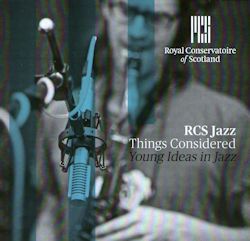With the referendum on Scotland’s independence due in 2014 it is timely
to remind ourselves to what extent the country is already ‘independent’.
It is self reliant in many fields and music is certainly one area where
it has always punched above its weight whether in classical music, folk
and traditional music and, as this disc shows once again, in jazz. The
liner notes by Tommy Smith the brilliant Scottish saxophonist and Artistic
Director of Jazz at the Royal Conservatoire of Scotland (RCS) explain
that these compositions are by the first graduates from the RCS’ Jazz
course which was only established in 2009 and is the first ever full-time
jazz course to be offered in Scotland. The five pieces on the disc are
written and played by the five musicians and if this is the standard
the course can turn out then three cheers for them, for Prof. Dr Tommy
Smith and for the course which will undoubtedly help, as Tommy Smith
says, to stem the flow of jazz musicians from the country. The music
is uniformly excellent and I hope they are as proud of it as they have
every right to be.
The first piece is called Simple Things by pianist Peter Johnstone and is a really smashing tune for the classic trio of piano, bass and drums
with a great main theme that is both simple and interesting. Against its background we are treated to some brilliant improvisation that shows Johnstone as
a first class jazz pianist and with a lovely solo from bassist Brodie Jarvie and solid drumming from John Lowrie.
Brodie Jarvie’s piece The Reaper’s War comes next with two saxes opening this sad and reflective tune that was inspired through Jarvie’s research
of the Thirty Years’ War. After the other instruments join in the piano takes the main theme while the saxes weave around each other in the background. It
is an extremely interesting piece.
John Lowrie’s The Squinty Bridge that depicts a well known Glasgow landmark is a tune in bebop style that brings back memories of American west
coast jazz from the 1950s; no bad thing since it was a classic era in jazz history. It is a really neat tune with lots of interest for something so
intrinsically simple as two little blues tunes in two different keys but as they say ‘it’s what you do with it that counts’ and Lowrie knows exactly what
to do and shows it emphatically.
Michael Butcher’s The Event was only written this very year just in time for his recital but it emerges fully formed and ready to go with a lovely
lilting theme from the sax and with great contributions from piano, bass and drums.
The disc’s final piece is Hurricane by tenorist Andrew Baker which was originally composed for acoustic guitar and later developed into a quartet
number and it works perfectly. I particularly loved the beautifully fat rich sounds of Jarvie’s bass that solos around 5 minutes in but the whole piece is
a joy.
The RCS says it is ‘creating the future for performance’ and this disc shows how successful they are in achieving that in the field of jazz for the talent
on display here is huge and the disc was a wonderfully rewarding listen and I shall be playing it often and letting my jazz loving friends hear what talent
there is ‘north of the border’ not that there was ever any doubt about that! The disc deserves to sell well and to be heard widely while the musicians’
future is assured and I’ll be first in the queue for anything any of them produce next. I urge all jazz lovers to grab a copy and prepared to be amazed.
Steve Arloff
